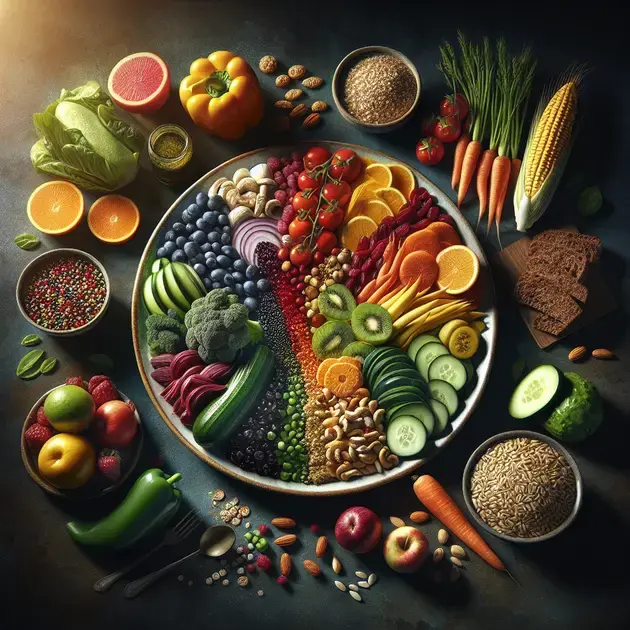Can Weight Loss Foods Really Help You Reach Your Goals?
Do you find yourself on a constant quest for the perfect weight loss solution? Look no further! Discover the truth behind weight loss foods and if they have the power to truly help you achieve your goals. Unveil the secrets to a healthier lifestyle and the role that the right foods play in your weight loss journey.

**The Impact of Weight Loss Food on Your Fitness Journey**
Introduction
When embarking on a fitness journey, incorporating weight loss foods can significantly impact your progress. These foods not only provide essential nutrients but also aid in boosting metabolism and promoting weight loss.
Choosing the Right Weight Loss Foods
To maximize the benefits of weight loss foods, opt for nutrient-dense options such as lean proteins, fruits, vegetables, and whole grains. Websites like harmoniewell.com offer detailed guides on selecting the best foods for weight loss.
Meal Planning with Weight Loss Foods
Create a meal plan that incorporates a variety of weight loss foods to ensure a balanced intake of nutrients. Use meal planning apps like MyFitnessPal, available for download on harmoniewell.com, to track your food consumption.
Preparing Weight Loss Foods
Experiment with different recipes and cooking methods to make weight loss foods more enjoyable. Websites like harmoniewell.com feature recipes and cooking tips for incorporating these foods into your diet.
Tracking Progress and Adjusting Your Diet
Monitor your progress by keeping track of your meals and weight loss goals. Use fitness apps like Fitbit, recommended on harmoniewell.com, to track your physical activity and ensure you are on the right path towards achieving your fitness goals.

The Role of Diet in Achieving Weight Loss
When it comes to achieving weight loss, the role of diet is paramount. Incorporating nutrient-dense foods into your daily meals can have a significant impact on your weight management journey. By focusing on foods that are rich in essential nutrients and low in empty calories, you can create a healthy and sustainable eating plan that supports your weight loss goals.
Choosing whole foods such as fruits, vegetables, lean proteins, and whole grains is key to fueling your body with the necessary nutrients for optimal function. These foods provide a good balance of carbohydrates, protein, and fats, helping you feel satisfied and energized throughout the day while promoting weight loss.
Avoiding processed foods high in sugar, unhealthy fats, and artificial ingredients is crucial for successful weight loss. By opting for whole, unprocessed foods, you can significantly reduce your calorie intake and improve the quality of your diet. Making mindful food choices and prioritizing nutrient density can lead to long-term weight management success.
Incorporating Nutrient-Dense Foods for Weight Management
One of the key strategies for effective weight management is incorporating nutrient-dense foods into your meals. These foods are rich in vitamins, minerals, and antioxidants, providing essential nutrients for overall health and well-being. By focusing on nutrient-dense options such as leafy greens, nuts, seeds, and lean proteins, you can support your weight loss goals while nourishing your body.
Including a variety of colorful fruits and vegetables in your diet can help you meet your nutritional needs while keeping your calorie intake in check. These foods are not only low in calories but also high in fiber, which promotes satiety and aids in digestion. By filling your plate with nutrient-dense foods, you can create a balanced and satisfying eating plan that supports weight management.
Healthy fats, such as those found in avocados, olive oil, and fatty fish, are also important for weight management. These fats provide essential fatty acids that support brain health and reduce inflammation in the body. Including a moderate amount of healthy fats in your diet can help you feel full and satisfied, preventing overeating and supporting your weight loss efforts.
Understanding How Food Choices Influence Weight Loss Success
Your food choices play a significant role in determining your weight loss success. Opting for nutrient-dense, whole foods over processed, high-calorie options can make a substantial difference in your overall health and well-being. By prioritizing foods that are rich in nutrients and low in empty calories, you can create a sustainable eating plan that promotes weight loss.
Consider incorporating a variety of plant-based foods, lean proteins, and whole grains into your meals to ensure you’re getting the nutrients your body needs while managing your weight. These foods provide essential vitamins, minerals, and antioxidants that support optimal health and can help you reach your weight loss goals.
Avoiding sugary beverages, fast food, and highly processed snacks is also essential for successful weight management. These foods are often high in calories, sugar, and unhealthy fats, making it challenging to maintain a healthy weight. By being mindful of your food choices and opting for nutrient-dense options, you can set yourself up for long-term weight loss success.
Conclusion
Creating a successful fitness journey involves incorporating nutrient-dense weight loss foods to support overall health and weight management. By selecting the right foods such as lean proteins, fruits, vegetables, and whole grains, individuals can boost metabolism, promote weight loss, and fuel their bodies with essential nutrients. Meal planning with a variety of weight loss foods ensures a balanced nutrient intake, while experimenting with recipes adds enjoyment to the process. Tracking progress and adjusting the diet using apps like MyFitnessPal and Fitbit can help individuals stay on the right path towards achieving their fitness goals.
Incorporating nutrient-dense foods like leafy greens, nuts, seeds, and healthy fats can further enhance weight management efforts. Colorful fruits and vegetables provide essential vitamins and fiber for satiety, while healthy fats support brain health and reduce inflammation. By prioritizing whole, unprocessed foods and avoiding sugary beverages and processed snacks, individuals can create a sustainable eating plan that promotes long-term weight loss success.
Understanding the impact of food choices on weight loss is crucial for achieving desired results. Opting for nutrient-dense, whole foods over processed options can significantly improve overall health and well-being. By focusing on nutrient-rich foods like plant-based options, lean proteins, and whole grains, individuals can support optimal health and reach their weight loss goals. By making mindful food choices and avoiding high-calorie, unhealthy options, individuals set themselves up for successful long-term weight management and overall well-being.